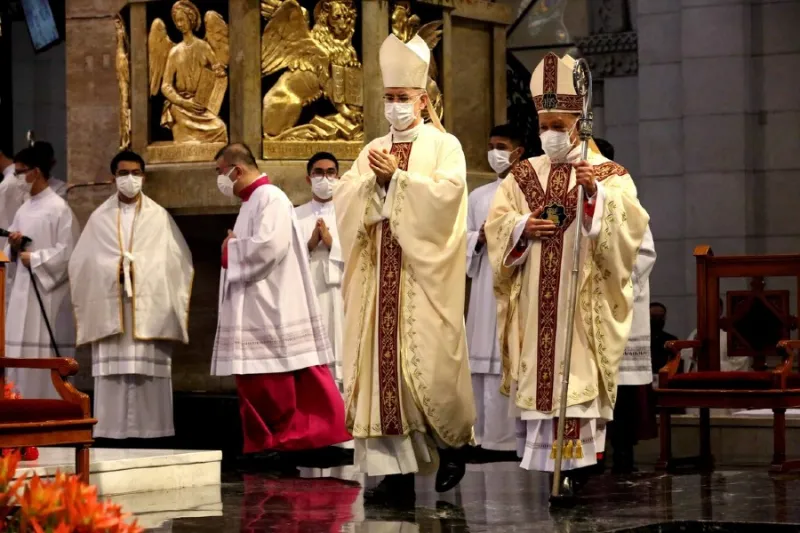 Cardinal Jose Advincula of Manila (right) is led to his cathedra inside the
Cardinal Jose Advincula of Manila (right) is led to his cathedra inside the
Manila Cathedral by Archbishop Charles Brown, papal nuncio to the
Philippines, during the cardinal’s installation as new prelate of the
Archdiocese of Manila on June 24, 2021. / Jose Torres Jr. / LiCAS News
Manila, Philippines, Jul 22, 2021 / 16:00 pm (CNA).
The Catholic Bishops’ Conference of the Philippines issued a statement on Thursday supporting Pope Francis’ motu proprio Traditionis custodes, which restricted the use of traditional liturgies.
“We express our obedience to and communion with the Supreme Pontiff as he leads us in the realization of the unity of the Church by means of the proclamation of the Gospel and in a particular manner in the celebration of the Eucharist,” said the Philippine bishops in a July 22 statement.
On July 16, Pope Francis issued an apostolic letter “motu proprio” regarding “the use of the Roman liturgy prior to the reform of 1970.” In his letter Traditionis custodes, Pope Francis said that it is now each bishop’s “exclusive competence” to authorize the use of the Latin Mass according to the 1962 Roman Missal in his diocese.
A motu proprio, literally “of his own accord,” refers to a document issued by the pope on his own initiative and personally signed by him.
The letter made changes to Pope Benedict XVI’s 2007 apostolic letter Summorum Pontificum. That 2007 letter had acknowledged the right of all priests to say the Traditional Latin Mass, and stated they did not need permission of their local ordinary to do so.
Mass according to the 1962 Roman Missal is also referred to as the extraordinary form of the Roman Rite, the Tridentine Mass, and the Traditional Latin Mass.
In their July 22 statement, the Filipino bishops said, “We reiterate the appeal of Pope Francis that ‘every liturgy be celebrated with decorum and fidelity to the liturgical books promulgated after Vatican Council II, without the eccentricities.’”
They added that as “guardians of the tradition,” according to the title of the papal document, each bishop as “moderator, promoter, and guardian of the whole liturgical life of the particular Church” must “implement the provisions of the motu proprio with utmost care, patience, justice and pastoral charity.”
The pope’s motu proprio establishes that “the liturgical books promulgated by Saint Paul VI and Saint John Paul II, in conformity with the decrees of Vatican Council II, are the unique expression of the lex orandi [the law of prayer] of the Roman Rite.”
Quoting from the pope’s letter, the Filipino bishops said that seminarians and new priests should “be formed in the faithful observance of the prescriptions of the Missal and liturgical books, in which is reflected the liturgical reform willed by Vatican Council II.”
The bishops said the motu proprio “gives us the guidelines on the modified use of the 1962 Roman Missal.”
Since the promulgation of Traditionis custodes, some bishops from other parts of the world have said that priests may continue to offer the Traditional Latin Mass in their dioceses, while others have restricted it in some parishes or banned it outright, as in Costa Rica.
Last year, the Vatican’s doctrinal congregation asked the world’s bishops to report on how Summorum Pontificum was being applied in their dioceses, through a nine-point survey.
“The apostolic letter is a fruit of the consultation with the Conferences of Bishops in 2020 and the recommendations made accordingly by the Congregation for the Doctrine of the Faith,” the Filipino bishops stated on Thursday.

[…]



